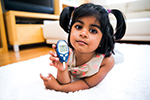
Even if we wanted to test our children's blood sugar every day just in case they develop type 1 diabetes, it wouldn't be practical. That's why parents don't normally know their child has it until he or she gets sick and they end up in the ER.
But a new blood screen is not only cheap and fast, it can be done on infants to predict whether that child will develop type 1 diabetes. Scientists behind the test had the goal of being able to educate parents early and prevent the negative physical and psychological trauma of an acute onset of the disorder.
Type 1 diabetes is an autoimmune disease, usually in children, where pancreatic cells that produce insulin are destroyed by the body. Children develop the cell-damaging auto-antibodies early on, usually around one to two years old, so the new blood screen could be done at routine doctor's visits.
So far, the test has been done on 27,000 children. About one hundred tested positive for the auto-antibodies and so far four have developed the disease. The children with normal glucose tolerance continue to have their blood sugar monitored weekly, while those that are abnormal do so daily but none of them have yet progressed to diabetes. These children and their parents were counseled and educated about the disease. The result is that none of the kids who tested positive had acute and serious effects from too much sugar in their blood.
The next step is testing many more children to see how accurate the test is. It may even help scientists identify environmental triggers for the development of these auto-antibodies that destroy insulin producing cells.
More Information
Early infant screening for type 1 diabetes shows promising results
Screening children aged between two and five helps to identify risk of type 1 diabetes before any symptoms have appeared, a pilot study has found...
Type 1 Diabetes Complications
Type 1 diabetes is complicated'and if you don't manage it properly, there are complications, both short-term and long-term...
Statistics About Diabetes
From the non-profit American Diabetes Association website